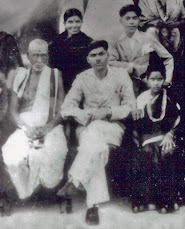The general requirements for a profession are well known. Here are a few of them will be considered.
1. The profession you want to learn: engineering, medicine, et c.
2. The aim behind the desire to learn the profession:
a. For money; b. for fame; c. for love of the profession; d. for dominating over others; e. for serving others; f. the procession attracts you because your father hates it; g. You hate the thing but your family thinks and you agree that the professional degree will add to the prestige of the family, and improve your status over others; h. you have nothing else to do; i. Your close friends are joining the same college, and so on.
2. The aim behind the desire to learn the profession:
a. For money; b. for fame; c. for love of the profession; d. for dominating over others; e. for serving others; f. the procession attracts you because your father hates it; g. You hate the thing but your family thinks and you agree that the professional degree will add to the prestige of the family, and improve your status over others; h. you have nothing else to do; i. Your close friends are joining the same college, and so on.
So while you may take up any profession, the aims underlying very, and the aim determines much of what happens to you thereafter.
You may have taken medicine as your profession, because your rich father wants you to do it. At college you are more likely to learn gambling and drinking, if gambling with life at other's expense is your real aim. Then you gamble with your father's money, gamble with time; gamble with your studies and with your examinations; and later on with people's lives. Already you toss a coin to jot down if there is sugar in a patient's urine without examining it, hoodwinking the professor, but with utter disregard to the fact that the amount of drug the patient gets depends on this, and you will be laughing like a jackass or a hyena in your hostel. So, though you declared that you wanted to learn medicine, and though you told the interviewing board at the time of admission that you love to serve humanity by studying medicine, what you really wanted to learn at the medical college was advanced gambling and you learn it.
So your joining a professional group or institute is no guarantee that you have come to learn that profession. You will continue to learn what you really wanted to learn, not what you said you were going to learn.
On the other hand, you may have no really liking for the profession, but you joined it, and you have become more and more interested and you have really begun learning the trade.
So the choice of a profession and the aims behind it may be at great variance. An awareness of these possibilities might help you make a speedier progress.
TEACHERS: Though you will be going to some impersonal institute or other for your profession, ultimately, you will be learning under a teacher or teachers.
The more complicated a profession is, the more difficult it is to get a good teacher, but slowly you will know that it is your aim that dominates what you will learn.
From the same well known surgeon four medical students may learn four different things:
1. Good surgery
2. How to make money
3. How to shout at assistants and patients
4. How to drink like a fish
2. How to make money
3. How to shout at assistants and patients
4. How to drink like a fish
because your teacher may be an excellent operative surgeon, with capacity to make money, with a desire to dominate and show off, and a capacity to hold a lot of alcohol. What you learn from this mixture is what you really intended to learn.
If you ask the students for their opinion of the surgeon, then each might answer as follows:
1. "He operates wonderfully. Such good hands and skill. It is a pleasure to watch him handling the knife, although he is bad tempered and said to drink like a fish and is quite showy."
This lad learns surgery.
This lad learns surgery.
2. "What is the use of his operations! He is a rogue, and is unscrupulous and I can't stand his shouting." This lad absents himself from the operation theatre, makes someone else sign the attendance register, and he does not learn surgery. He continues to learn what he has always been learning --- to be offended by others' behaviour, and to speak easy lies to avoid confrontation. He never really wanted to learn surgery.
3. "He is a dynamic fellow, powerful chap! He is a terror and everyone trembles and obeys him. Strict, that's what. In a theatre that's what makes a good surgeon. Have you seen how nurses and patients shiver in front of him!"
This boy does not learn surgery. He learns shouting and bossing over others. Life outside did not give him much chance to shout at others. Now, he gets the opportunity to shout at helpless assistants and poor, frightened patients. This is what he actually was trying to learn - to boss over others and make opportunities for that.
4. "His nerves are steady because he drinks. Did you see how much alcohol he takes! Grand fellow! What do the fellows know who talk of prohibition? For instance, I myself cannot face an interview without a drop of the good old stuff."
This boy does not learn surgery. He learns to drink, or drink with added reasons. He wants to have the degree in order to continue learning what he has always been learning - to be respectable and irresponsibly happy.
Thus, the real aim is different from the professed aim. The real aim acts like a magnet and attracts to itself all the conditions necessary to realize itself. You can know aims by seeing exactly what is happening to you, and what you are becoming. You are day by day, becoming a picture of your true aim. You are a puppet, a lump of clay in the hands of your aim, whatever your protestations or professions to the contrary, and wherever you are.
The same is true whether you have chosen a medical college for learning medicine, or an ashram to realize God: You will learn what you really came to learn, not what you said was your aim. The medical college and the ashram become false-fronts for your basic aim.
If you start at Madras and say you want to go to Delhi, but you are actually buying a ticket to Trivandrum, because your friend is going there, and you also feel that it is better to have a look at Cape Comorin, and a few days at Colombo, which it is foolish to miss having come so far south - well, there is no need to ask what your true aim is! And if then you accept a job in South Pole because it is a pity to waste such a good opportunity, and the weekly astrology confirms your desire to do so, you need not doubt any further, though you may shout at Fate for having stood in the way of your valuable ambition to see Delhi.
You become what your true aim is, and unless one makes an effort, it is not easy to distinguish between your professed aim and your true aim. This is not a day's job. Aims should be constantly reviewed. If you are not making much progress in your declared aim, and you are frequently failing in your examinations, it is high time you assessed your true aim.











